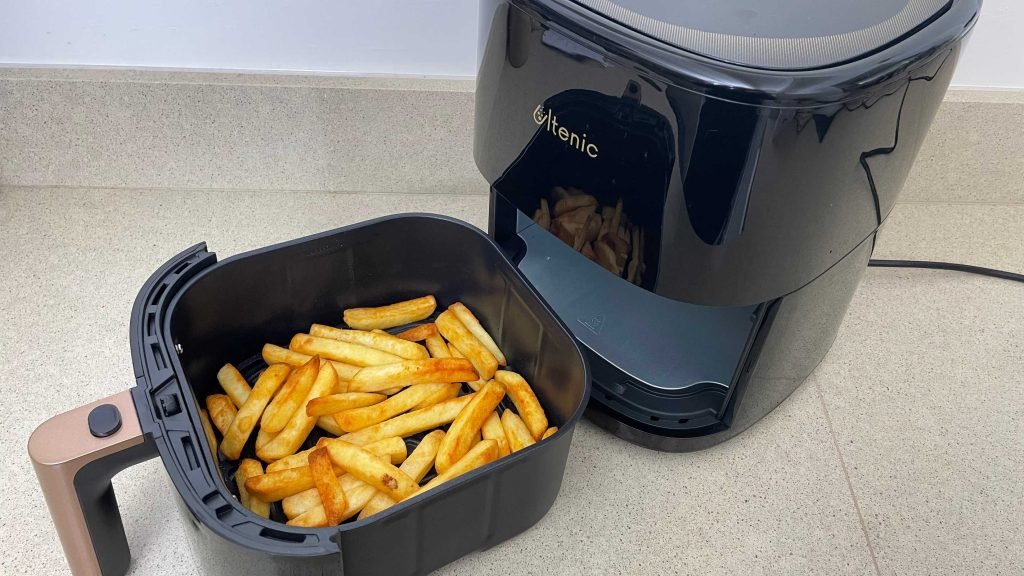Yes, air fryers generally use less electricity compared to traditional ovens, making them a more energy-efficient choice for quick meals. Although they do consume power while in use, their fast cooking times and smaller size help reduce overall energy consumption.
Air fryers are quite popular for those looking to cook healthier and faster, but many wonder if they guzzle a lot of electricity in the process. The good news is that they are designed to be energy-efficient. They heat up quickly, cook food faster, and require less power than large conventional ovens. While they do use electricity, their efficiency means you won’t see a significant spike in your energy bills, especially if used regularly for quick meals. Understanding how much energy your air fryer consumes can help you decide if it’s the right appliance for your kitchen, saving you both time and money without sacrificing convenience.
Does Air Fryer Use a Lot of Electricity? A Complete Look at Energy Consumption
Understanding How Air Fryers Work
Air fryers cook food using rapid hot air circulation, which mimics deep frying without the oil. They typically contain a heating element and a fan that distribute heat evenly. Because of this design, they tend to cook quickly and efficiently compared to traditional ovens.
Average Power Consumption of Air Fryers
Most air fryers operate between 800 and 1500 watts during use. This wattage indicates how much electricity they draw when running. For example, a 1500-watt air fryer uses 1.5 kilowatt-hours (kWh) of energy per hour of continuous operation.
Comparing Wattage Among Different Models
| Air Fryer Model | Power Usage (Watts) | Typical Cooking Time (Minutes) | Energy Used per Session (kWh) |
|—————–|——————-|——————————|——————————|
| Small Compact | 800 | 15-20 | 0.2 |
| Mid-Size | 1200 | 20-25 | 0.4 |
| Large Capacity | 1500 | 25-30 | 0.63 |
This table shows that higher wattage models tend to consume more energy, but cooking time also plays a significant role.
How Much Electricity Does an Air Fryer Use in a Typical Meal?
The energy consumption depends on cooking duration and wattage. For a typical 15-minute cook time with a 1500-watt air fryer, the energy used would be around 0.375 kWh. Compare this with traditional oven cooking, which often takes longer and consumes more energy overall.
Calculating Cost Based on Electricity Rates
If your electricity cost is $0.12 per kWh, then a single 15-minute air fryer session costs about $0.045. Over a month, cooking daily, the total cost amounts to approximately $1.35, which is quite affordable.
Is Air Fryer Energy Consumption Higher Than Other Appliances?
Air fryers generally use less energy compared to conventional ovens and deep fryers. A standard oven might use 2000-3000 watts and take longer to cook food. Deep fryers also consume significant power, especially when heating large quantities of oil.
Energy Consumption in Comparison
- Air Fryer: 800-1500 watts, shorter cooking times
- Conventional Oven: 2000-3000 watts, longer cooking times
- Deep Fryer: 1500-1800 watts, longer preheating and cooking
This comparison shows that air fryers are often more energy-efficient for everyday cooking.
Factors That Affect Energy Usage in Air Fryers
Energy consumption is influenced by various factors, including model size, cooking temperature, and duration.
Cooking Temperature and Time
Higher temperatures may heat the appliance more quickly but can also increase the overall energy used if cooking times are lengthy. Efficient use involves setting the appropriate temperature for the food being prepared.
Size and Capacity of the Air Fryer
Larger units require more power to heat their bigger cooking chambers. Smaller models are energy-efficient for cooking smaller portions.
Preheating and Cooking Habits
Preheating can consume additional energy, but it’s often necessary for even cooking. Using the appliance only when needed and avoiding unnecessary preheating can lower energy use.
Tips to Reduce Electricity Consumption When Using an Air Fryer
To minimize energy use, consider these tips:
- Use the appropriate size: Match the air fryer size to your meal to avoid unnecessary energy waste.
- Batch cooking: Prepare multiple items at once to maximize efficiency.
- Adjust temperature and time: Use the lowest effective temperature and shortest cooking time.
- Keep the unit clean: A clean air fryer operates more efficiently, reducing power draw.
- Do not open during cooking: Opening the basket releases heat, making the appliance work harder to maintain temperature.
Additional Related Topics
Environmental Impact of Using an Air Fryer
Because air fryers use less energy than traditional appliances, they contribute to a smaller carbon footprint. Choosing energy-efficient models also helps reduce electricity use and greenhouse gas emissions.
Are There Energy-Saving Features in Modern Air Fryers?
Some newer models come with features like automatic shut-off and smart temperature controls. These features help conserve energy by turning off the device when cooking is complete or adjusting heat based on the food.
Electricity Consumption Trends and Future Technology
Manufacturers are developing more energy-efficient appliances, including air fryers, using better insulation and advanced heating elements. These advancements aim to cut power use further without sacrificing performance.
Understanding the Long-Term Costs
Although the initial purchase price varies, energy-efficient air fryers save money over time through lower electricity bills. Evaluating power usage alongside performance can help select a model that balances cost and convenience.
Summing Up
In summary, while air fryers do consume electricity, their usage is generally lower compared to traditional cooking methods. Their rapid cooking times and efficient design help keep energy costs manageable. Being mindful of cooking habits and choosing the right model can further reduce electricity consumption.
The conclusion is that for most households, using an air fryer is an energy-conscious choice that offers convenience without significantly increasing electricity bills. Proper use and maintenance make air fryers a practical, cost-effective appliance for everyday cooking.
Air Fryer vs. Oven: Which Saves More Money on Energy Bills? – Which?
Frequently Asked Questions
How much electricity does an air fryer typically use during cooking?
Most air fryers consume between 800 to 1500 watts of power while operating. The actual energy usage depends on the cooking duration and the specific model. For example, a 1500-watt air fryer running for 20 minutes uses roughly 0.5 kWh of electricity, which is comparable to other small kitchen appliances.
Does using an air fryer significantly increase electricity bills?
Using an air fryer for regular meals generally doesn’t lead to a substantial rise in your electricity bill. Since it cooks faster than traditional ovens and uses less energy overall, it can be an energy-efficient choice. However, the impact varies depending on how frequently and for how long you use it.
Can I reduce electricity consumption when using an air fryer?
Yes, you can lower energy consumption by choosing the correct size of the air fryer for your needs, avoiding unnecessary preheating, and cooking multiple items at once whenever possible. Additionally, setting the temperature and timer to optimal levels helps ensure efficient energy use.
How does the power consumption of an air fryer compare to that of a conventional oven?
Air fryers typically use less power than conventional ovens because they heat up quickly and cook food faster. An oven might use 2000 to 5000 watts, whereas an air fryer usually operates around 800 to 1500 watts. This efficiency makes air fryers a more energy-friendly option for small meals.
Is it worth choosing a more energy-efficient air fryer model?
Opting for an air fryer with better energy efficiency can save you money over time, especially if you cook frequently. Look for models with good insulation and adjustable power settings. These features help reduce unnecessary energy use while maintaining cooking quality.
Final Thoughts
Air fryers are energy-efficient appliances used for quick and healthy meals. They consume less power than traditional ovens because they heat up faster and cook food quickly.
While they do use electricity, their overall power usage remains moderate.
does air fryer use a lot of electricity is a common concern, but it generally consumes less energy compared to other cooking methods, making it an eco-friendly choice.
As an Amazon Associate, We earn from qualifying purchases. When you purchase a product through Amazon links on kitchenadvising.com, we may earn a small commission at no extra cost to you. This helps support the site and keep our content free.


